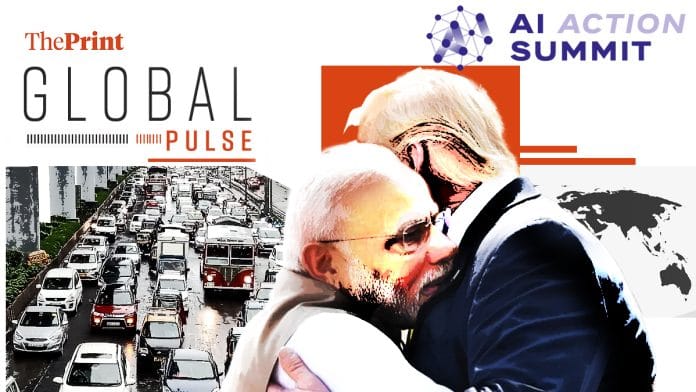New Delhi: The world’s gearing up for the next chapter of the “Modi-Trump bromance” as Prime Minister Narendra Modi lands in Washington DC tonight to meet US President Donald Trump at the White House.
The Economist asks: Is MAGA actually great for India? The view from over here in India looks rosy, and The Economist agrees. “America is betting on India’s inexorable rise,” the story says.
There are typical tensions, of course, from trade to illegal immigration. Trump 2.0’s “triumphalist America-first agenda” could lead to new flare-ups when it comes to defence and technology deals too.
But The Economist reminds its readers that the Indo-US relationship “rests on a bipartisan article of faith: both need each other to hedge against China”.
A rise in tensions between India and China pushed India further into Uncle Sam’s arms, the story says, and Trump’s the kind of leader who is “uninterested in imparting the liberal lessons on human rights that have long exasperated India’s elites”.
“Yet America’s hyper-assertive nationalism and desire to draw economic activity within its borders could create stresses with India, which views itself as a wholly-independent actor rather than a partially-subordinate ally and which is keen to build-up its own manufacturing base,” the story says, before unpacking its predictions on trade, migration, defence, manufacturing and tech.
Trump may lose patience with India’s “multi-alignment”, and his techno-nationalism could come into conflict with India’s “ultimate ambition to become a major tech player in its own right”, The Economist says.
“India’s best hope is to argue that its home-grown tech offerings augment American power: its cheap payment and identification systems could offer alternatives to Chinese models to countries elsewhere in the global south—and without competing with upscale American ones,” the analysis says.
“For years sceptical American analysts have asked what their government gains from working with a sometimes prickly India, asking if the ‘India bet’ will pay off. The roller-coaster ride of a second Trump term may lead more Indians to ask the same question about America.”
The Wall Street Journal reports that India has a caste system even for drivers.
“Driving in New Delhi can be chaotic, but adding to the madness is an unusual caste system that gives unofficial preference to some less-than-essential workers. Lawyers, government officials, journalists and even retired military officers are among a set of professionals who adorn their private vehicles with decals to publicise their occupations and the special status they say it confers,” the report says.
There are generally no laws that give preference to drivers with certain professions—except perhaps doctors—and some states have banned stickers on private vehicles. But the popularity of stickers, and the deference the Wall Street Journal says they inspire, is “partly a reflection of India’s longstanding caste system”, the report alleges.
It goes on to say that the educated class want to flaunt their status in the social hierarchy through these stickers. It’s a strong statement from WSJ—but the report points out that many states like Punjab and Haryana and Tamil Nadu have actually banned the use of unauthorised emblems and stickers on cars.
“The police said that the most-concerning stickers identified an affiliation with the press, the state or city government, the state-owned power company, or the police,” it says.
Many people are modifying their private vehicles to “boost the air of authority”, according to the report. “That hunger for respect on the roads has been turbocharged by the newly wealthy, who yearn for symbols to flaunt their riches and boost their status,” reports WSJ.
“Many have learned they can climb the pecking order of Delhi traffic by buying bigger, fancier and more expensive vehicles.”
And it looks like people are settling to buy stickers that say “Govt of India” or a job like cop, lawyer, or journalist. The nouveau riche, especially, “have taken to decorating their cars with police sirens and flashing lights”. It gives them a free pass on the roads of India, according to the report.
Meanwhile, Global Times adds its two cents to the Paris Artificial Intelligence (AI) Action Summit.
“China has always participated in global cooperation and governance on AI with a highly responsible attitude,” says its report on how world leaders sought “common ground” at the summit.
Modi and French President Emmanuel Macron co-hosted the summit, while Chinese Vice Premier of the State Council Zhang Guoqing attended as President Xi Jinping’s representative. China, France, Germany and India were among 61 signatories who agreed it is a priority that “AI is open, inclusive, transparent, ethical, safe, secure and trustworthy, taking into account international frameworks for all”.
“Hegemony remains the biggest obstacle in the development of AI. Such cooperation is currently being blocked and separated due to this hegemonic mindset,” Global Times quoted experts as saying.
“Chinese technology should be treated fairly and objectively. Accusations that attempt to smear the Chinese tech company (presumably referring to global reactions to DeepSeek) stem from biased attitudes toward China’s development.”






